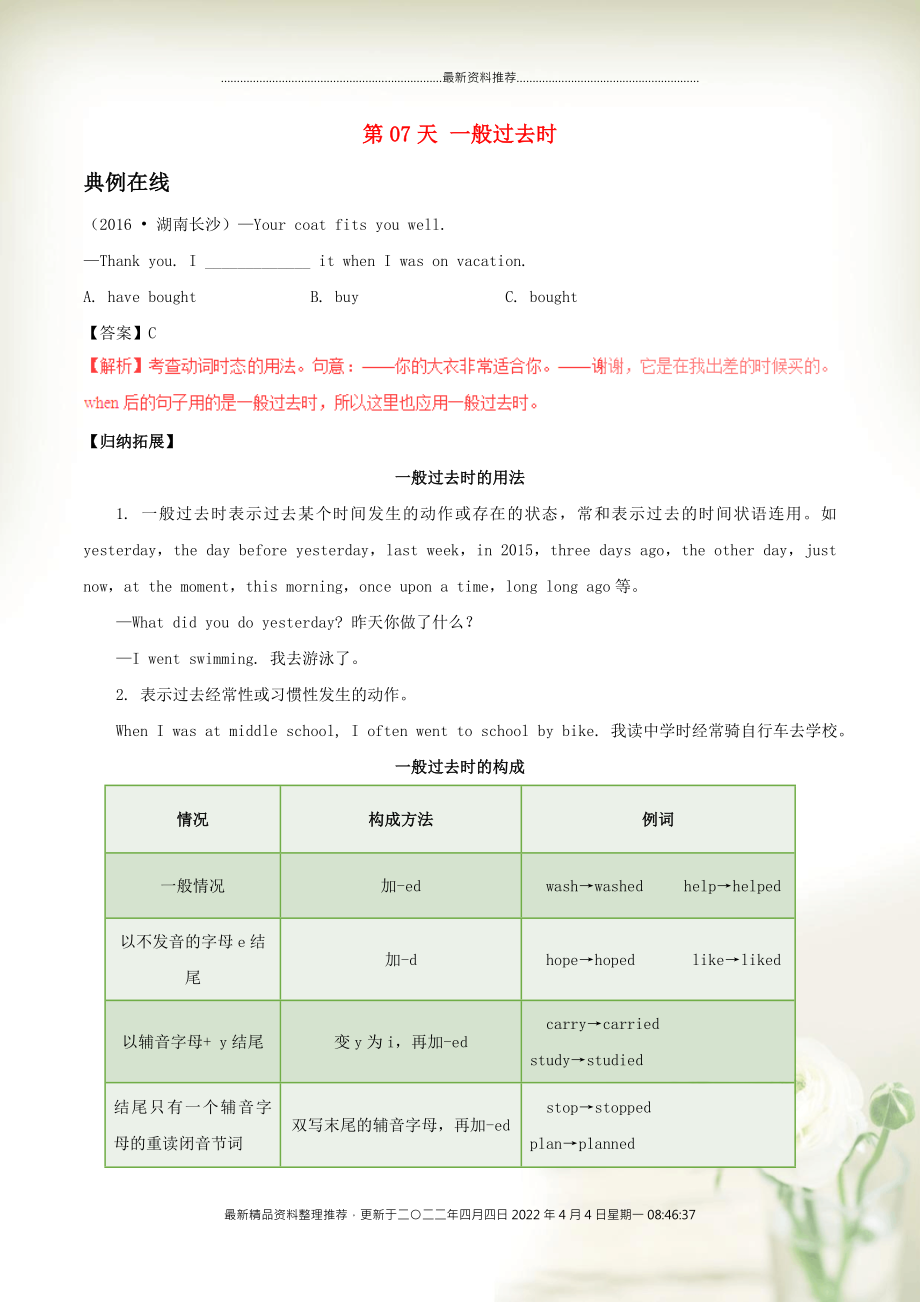《八年級(jí)英語(yǔ)暑假作業(yè) 第07天 一般過(guò)去時(shí) 人教新目標(biāo)版》由會(huì)員分享�,可在線(xiàn)閱讀,更多相關(guān)《八年級(jí)英語(yǔ)暑假作業(yè) 第07天 一般過(guò)去時(shí) 人教新目標(biāo)版(3頁(yè)珍藏版)》請(qǐng)?jiān)谘b配圖網(wǎng)上搜索����。
1、……………………………………………………………最新資料推薦…………………………………………………
第07天 一般過(guò)去時(shí)
典例在線(xiàn)
(2016 ? 湖南長(zhǎng)沙)—Your coat fits you well.
—Thank you. I _____________ it when I was on vacation.
A. have bought B. buy C. bought
【答案】C
【歸納拓展】
一般過(guò)去時(shí)的用法
1. 一般過(guò)去時(shí)表示過(guò)去某個(gè)時(shí)間發(fā)生的動(dòng)作或存在的狀態(tài)����,常和表示過(guò)去的時(shí)間狀語(yǔ)連用。如 yesterday���,the day b
2�、efore yesterday���,last week��,in 2015��,three days ago�����,the other day�����,just now�,at the moment,this morning�����,once upon a time����,long long ago等。
—What did you do yesterday? 昨天你做了什么���?
—I went swimming. 我去游泳了。
2. 表示過(guò)去經(jīng)常性或習(xí)慣性發(fā)生的動(dòng)作�。
When I was at middle school, I often went to school by bike. 我讀中學(xué)時(shí)經(jīng)常騎自行車(chē)去學(xué)校。
一般
3�����、過(guò)去時(shí)的構(gòu)成
情況
構(gòu)成方法
例詞
一般情況
加-ed
wash→washed help→helped
以不發(fā)音的字母e結(jié)尾
加-d
hope→hoped like→liked
以輔音字母+ y結(jié)尾
變y為i����,再加-ed
carry→carried study→studied
結(jié)尾只有一個(gè)輔音字母的重讀閉音節(jié)詞
雙寫(xiě)末尾的輔音字母��,再加-ed
stop→stopped plan→planned
一般過(guò)去時(shí)
肯定句的過(guò)去式��,規(guī)則動(dòng)詞加-ed�,不規(guī)則的必須記��。
否定形式疑問(wèn)句�����,沒(méi)有be加did�����。
如把did加在前��,動(dòng)詞
4��、也要還原形�����。
方法技巧
試題推薦
1. We _____________ a picnic in the park yesterday.
A. had B. has
C. have D. having
2. — I hear Sam has go
5�����、ne to Qingdao for his holiday.
—Oh, how nice! Do you know when he _____________?
A. left B. was leaving
C. has left D. had left
3. —Mario, I hear you bought a new car.
—Yes. It _____________ in Korea and I like it very much.
A. produces B. is produced
C. will
6、 produce D. will be produced
4. You _____________ the first prize in the English speech contest. Congratulations!zxx.k
A. win B. won
C. have won D. will win
5. Paul and I _____________ tennis yesterday. He did much better than I.
A. play B. w
7���、ill play
C. played D. are playing
6. —Did Tony _____________ fishing with you last Sunday?
—Yes, he did. He _____________ fishing with us.
A. goes�����;goes B. go�����;goes
C. went�;went D. go����;went
參考答案
1. A 【解析】句意:昨天我們?cè)诠珗@里野餐了。根據(jù)時(shí)間狀語(yǔ)yesterday可知此處要用一般過(guò)去時(shí)���,即
8、had���,故選A�。
2. A 【解析】句意:——我聽(tīng)說(shuō)Sam去青島度假了?!叮昧?��!你知道他是什么時(shí)候出發(fā)的嗎����?根據(jù)語(yǔ)境可知�,這里詢(xún)問(wèn)的是"出發(fā)"的動(dòng)作是什么時(shí)候完成的,時(shí)態(tài)應(yīng)用一般過(guò)去時(shí)����。結(jié)合選項(xiàng)可知應(yīng)選A。
3. B 【解析】句意:——馬里奧���,我聽(tīng)說(shuō)你買(mǎi)了一輛新車(chē)�����?����!堑?。它是韓國(guó)生產(chǎn)的,我非常喜歡它����。根據(jù)語(yǔ)境可知車(chē)以前就被制造好了,因此要用一般過(guò)去時(shí)的被動(dòng)語(yǔ)態(tài)�����。故選B����。
4. B 【解析】win意為"贏",由下文的Congratulations"祝賀你"可推斷出獲得第一名的動(dòng)作已經(jīng)發(fā)生過(guò)了�,表示過(guò)去發(fā)生的事情要用一般過(guò)去時(shí),故選B�����。
5. C 【解析】考查動(dòng)詞的時(shí)態(tài)
9����、。句意:我和保羅昨天打網(wǎng)球了�����。他比我打得好���。句子中有明確的時(shí)間狀語(yǔ)yesterday(昨天)���,所以用一般過(guò)去時(shí),故選C��。
善于思考����,勤于總結(jié)!
最新精品資料整理推薦�,更新于二〇二二年四月四日2022年4月4日星期一08:46:37
 八年級(jí)英語(yǔ)暑假作業(yè) 第07天 一般過(guò)去時(shí) 人教新目標(biāo)版
八年級(jí)英語(yǔ)暑假作業(yè) 第07天 一般過(guò)去時(shí) 人教新目標(biāo)版

